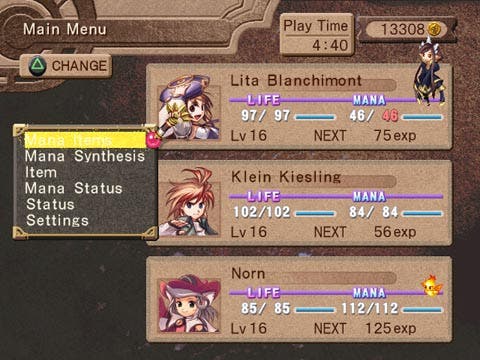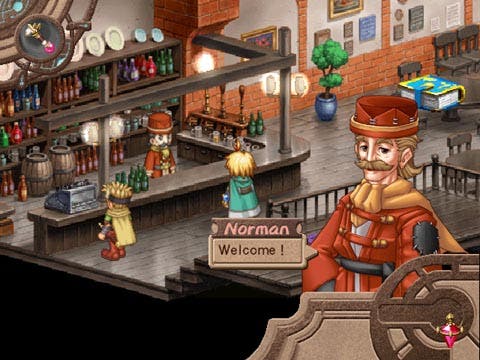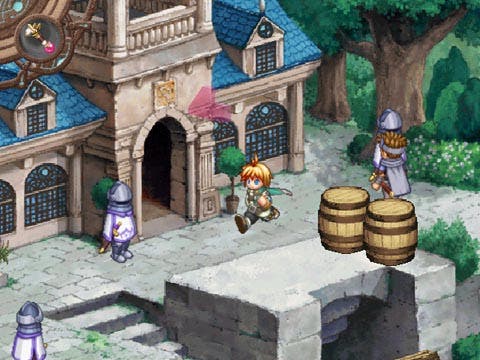Atelier Iris: Eternal Mana
Nippon Ichi loves to cook.
How often have you sat in the fuzzy white cathode warmth of your television, PS2 whirring lazily beneath, poring over your item inventory list for 45 minutes straight?
Truth be known, most RPGs encourage you to be a sticky-handed, vulgar thief.
You're made to rush around their worlds, clicking X on every chest and smashing every brown barrel, with scant regard for the virtual owners that stored their goods there in the first place. You greedily sling the fruits of your unstoppable hunger deep into an infinite backpack - often without a second look.
To add insult to injury, you'll perhaps use 20 per cent of the things you find to further your quest. Yet still you continue to stockpile potions and elixirs and herbs and phoenix-downs like a fat, middle-class businessmen caught in the headlamps of a national petrol shortage.
Then, after all that, you just use your bright-eyed mage to heal your team when need be, leaving your precious items tucked away untouched and redundant.
You're a little videogame capitalist; a dead-eyed role-playing consumerist, feverishly buying things you don’t need from shopkeepers you don’t care about, finding empty comfort in hoarding surplus items. Just. In. Case.
But a different kind of economy breathes in Atelier Iris’ world. This game makes your heart skip a beat when you pluck a new herb from a grass thicket or catch a new kind of fish from the rippling lake. You'll carefully wipe it down, note the markings and check its name before scurrying back to your headquarters to... well, to pore over your item inventory for 45 minutes solid.
Then you carefully weigh each item in your mind, considering its possibilities as a cooking ingredient, imagining what might appear if you put this potato with that piece of string into the cooking pot. Eventually, lungs pregnant with trapped breath, you gingerly drop the items into your iron cauldron.
Magic bubbles burst tantalisingly and, then, at last - Eureka! You suck in the aroma of a revolutionary never-before-discovered stew.
It doesn't end there either. Next you hurry round the corner to your local restaurant. You've eaten here ever since you were a tiny level 1 alchemist. You know the owner’s name; he always happily gives you information on the faces he’s seen in his shop recently. A spy-chef.
But times have been hard. Good ingredients have been hard to come by, and the punters have noticed; sales are dangerously low. You feel some responsibility for his slim account books but now, well now you have your recipe - the great culinary saviour that will turn this place’s fortunes! It's time to reciprocate.

He tastes your new dish and, after a long pause, his crinkled, weathered face erupts into a warm smile. You glow with satisfaction; a pixel philanthropist tirelessly serving your sprite based community of frie... OH BOLLOCKS! Completely. Forgot. About. The. Quest. Again.
Atelier Iris is the latest iteration in a series of exceptionally popular Japanese 'Alchemy-RPGs'. It's the first to find its way to the West and, once you notice it's deep, customisable mechanics it will be no surprise to hear that it was Nippon Ichi’s first third-party US release a few months back. Now Koei is bringing the world of Regalizine to Europe next year, and fans of kooky RPGs should squirm with delight now. Frankly it's lovely.
The game follows Klein, a young alchemist who possesses the power to extract the elements of all the world's objects and use them create new items. To do so he has to enlist the help of tiny elemental creatures called 'mana'. At the start of the game just one mana accompanies your team but as you progress you discover new ones, all of whom join you on your quest against the megalomaniac overlord antagonist, Mull.
Your mana can be equipped to your team of characters, resulting in specific stat bonuses. Additionally, some mana give you special powers that you'll have to use to get through some of the dungeons in the game - much as new abilities help Link unlock new areas of Zelda. As you call upon mana to create items or use abilities, their energy level decreases, and they begin to get annoyed with you (even to the point of refusing to work for you altogether) so you need to gift your mana items to keep them happy, adding complexity to the whole economy of items.

And it's Atelier Iris's economy wherein lies its delight. Traditional RPG mechanics have been turned on their head and rather than forcing you to take-take-take, it encourages you to give back to the in-game community. As the plot unfurls you'll have to develop both your cooking and alchemy skills to outfit your team with both equipment and useful items. Items you create can be given to shopkeeper who will then stock a limited supply of them for sale. You can also see how the quality of the item has affected its wider sales. Find better ingredients and you can improve the quality of your recipes and improve the shopkeeper's reputation and fortunes with it. It’s both cute and addictive. Items you create can go on to be used in new recipes and the onion layers of complexity build sky high.
A cheerful caravan-based traveller girl even keeps a log of all the items you find and create in the game leading you to search out new recipes and fill in the blanks in. As you do so you unlock bonuses and the quest for completion is something you'll either love or hate.
However, outside of the item creation sections, Atelier Iris is a fairly standard RPG with the usual random encounters, small but interesting dungeons and stock identikit character types. But it's all executed delightfully. Nippon Ichi/Koei have done their usual sparkling job of translating the dialogue and you'll find yourself often laughing out loud at the game's leftfield humour.

In battle, only three characters can fight on screen in the Super Nintendo-era Final Fantasy style fights, although you can swap members off and on the subs bench whenever required. Pleasingly your entire party receives experience points (albeit slightly less if they were off screen at the time) no matter who deals the finishing blow. The customisation deepens as your characters receive skill points when they level up; points which can then be distributed to bolster a wide range of special attacks, defensive skills and support abilities.
This is a quintessentially Japanese videogame reminiscent of classic 16-bit titles such as Secret of Mana and Chrono Trigger, albeit married to a Nippon Ichi-style fanaticism for detail and Pokemon's kleptomaniacal Gotta Catch ‘Em All mechanic.
Fans of bombastic, rich, expensive cut-scenes and acre-wide sci-fi plot lines will be disappointed, because Atelier Iris: Eternal Mana is old-school in look, character and budget. However, if it charms you, you'll be instantly hauled into its delightful world, desperate to help out in anyway you can - whether that's by supporting the lowliest street trader or tackling the powers and principalities that threaten its very existence.

